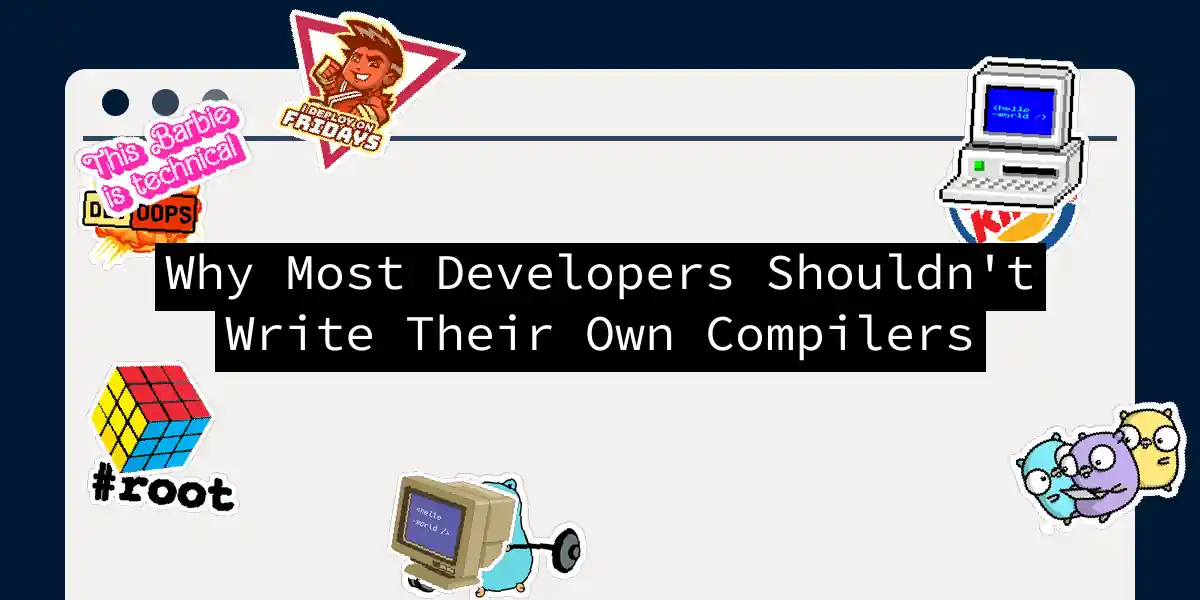Writing a compiler is one of those mythical quests that many developers dream of, but few should actually embark on. It’s like trying to build a spaceship in your backyard; it sounds exciting, but it’s a monumental task that requires a depth of knowledge and resources that most of us simply don’t have.
The Allure of Compiler Writing
There’s a certain allure to writing a compiler. It’s the ultimate challenge for any programmer: creating a tool that can translate human-readable code into machine code that a computer can execute. It’s like being the architect of a new language, defining how it will be used, and shaping the future of software development.
However, this allure often blinds developers to the harsh realities of compiler development. Here’s a story that illustrates this point perfectly:
Imagine a young, ambitious developer determined to generate the optimal machine code for every possible case. They go all out, using jump tables, optimizing for common divisors, and even handling cases where values are powers of two. Sounds impressive, right? But the end result is a mess that nobody wants to touch. The person who inherited this code years later hated the original developer for it[1].
The Complexity of Compiler Development
Compilers are incredibly complex pieces of software. They involve multiple stages, from lexical analysis to syntax analysis, semantic analysis, optimization, and finally, code generation. Here’s a simplified flowchart to give you an idea of the process:
Each stage requires a deep understanding of computer science concepts, programming languages, and software engineering principles. For instance, lexical analysis involves tokenizing the source code, which can be tricky even for simple languages. Syntax analysis involves parsing the token stream into an abstract syntax tree (AST), which can be a daunting task, especially for languages with complex grammars.
The Pitfalls of Over-Optimization
One of the biggest pitfalls in compiler development is over-optimization. Developers often get caught up in trying to make their compiler as efficient as possible, which can lead to overly complex code that is hard to maintain and debug.
For example, consider the case of a developer who implemented a ball object in an API with the x- and y-coordinates specifying the upper-left corner of the bounding box instead of the center of the circle. This simple mistake, though seemingly minor, caused significant issues for millions of users, including children and new programmers[1].
The Cost of Custom Solutions
Writing a custom compiler also means you’re committing to maintaining it. This includes fixing bugs, optimizing performance, and ensuring compatibility with different platforms. Here’s a sequence diagram that shows the ongoing process of maintaining a compiler:
This cycle never ends, and it’s a heavy burden to carry, especially if you’re a solo developer or a small team.
The Wisdom of Using Existing Tools
So, why should most developers avoid writing their own compilers? Here are a few compelling reasons:
Existing Solutions: There are already well-maintained, highly optimized compilers available for most programming languages. Using these existing tools saves time and effort that would otherwise be spent on developing and maintaining a custom compiler.
Community Support: Popular compilers have large communities and extensive documentation. This means there are many resources available for troubleshooting and learning, which can significantly reduce the learning curve.
Focus on Core Development: By using existing compilers, developers can focus on what they do best: writing application code. This allows for more efficient use of time and resources, leading to better software overall.
Avoiding Common Mistakes: Learning from the mistakes of others can be invaluable. Using established compilers means you benefit from the collective wisdom and experience of the developers who have worked on them over the years.
Conclusion
Writing a compiler is not a task for the faint of heart. It requires a level of expertise, resources, and dedication that few developers can afford. While the idea of creating a new language or optimizing a compiler might be appealing, the practical realities often make it a less-than-ideal choice.
So, the next time you’re tempted to embark on this grand adventure, remember: sometimes the best code is no code at all. Use what’s already available, and focus on what you do best – writing great software that solves real-world problems. After all, as the saying goes, “don’t reinvent the wheel unless you plan on learning more about wheels.”
